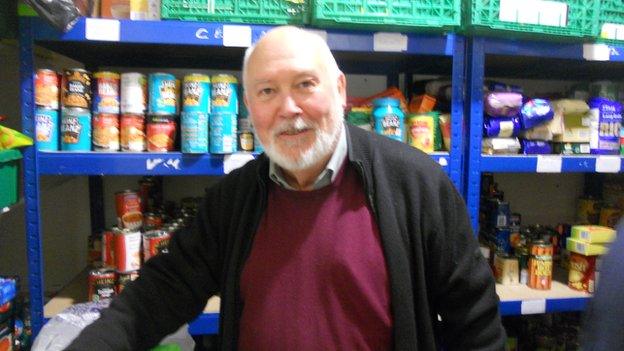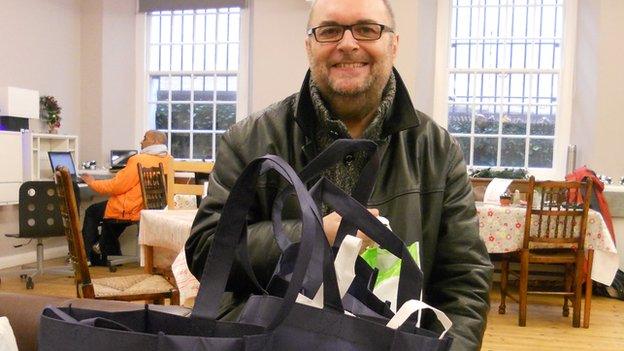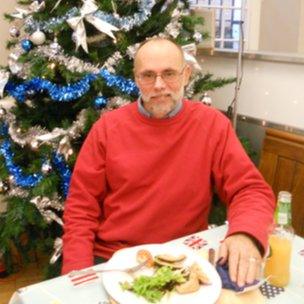Christmas dinner on a food parcel
- Published

Richmond food bank's very own Father Christmas, Nick, loves handing the food parcels out
Christmas dinner for many children this year may be a food parcel from a local food bank, the charity Barnardo's is warning. In a survey of 118 of its services - including 65 children's centres - it found 94% reported an increased demand for food bank help.
The BBC News website's Hannah Richardson spent an afternoon at a food bank.
A steady stream of people descend into the wholesome Christmas welcome of the Vineyard Community Centre in the affluent west London area of Richmond.
Some have their heads up and arms laden. Others have their heads down.
It is only this body language that marks out the people who are here to give from those who hope to receive. Otherwise they seem the same.
"You can't tell what a person looks like who hasn't eaten for three days," says Bob Kimmerling, director of the Richmond food bank.
"Or a couple who are having to share a tin of soup so their children can eat."
Sitting in the warm, in front of a sparkling Christmas tree, he says: "It's a big step coming in to ask for help at a food bank."
"You can imagine someone coming here full of anxiety and possibly depressed. So we try to make sure that this is an environment in which they are touched by a little hope," he adds.
'Back-up'
And the warmth and generosity of the place is palpable. Softly lit and shimmering with tinsel and Christmas lights, the centre is a hive of activity as volunteers busy themselves unloading tins of tuna and packets of pasta.
Other staff sit face to face with potential recipients going through the series of misadventures that has led them to walk through these doors and ask for help. This way they aim to tackle the root cause of the crisis and help the individual to help themselves.
It's Paul's first time at the centre. He tells volunteer worker Chris how delays and changes to his benefits have left him without money for two months.
Shaking lightly with the intensity of his situation, Paul, tells how he used to be wealthy and run his own computer company. After inheriting a lot of money several years ago, he made some bad investments and ended up in serious debt.
"It's all gone now," he adds, evidently still trying to digest the enormity of his predicament.
Dipping his eyes momentarily, he also admits to a serious medical condition that prevents him from working, and problems with alcohol and a gambling addiction.

Paul's frown breaks into a smile on seeing the food parcel
Like the majority of the food bank's users, he has been referred for help by one of the local front-line services, in this case Citizens Advice.
"I've got food left in my house to last me a day or two, but I am worried about whether I am going to get my money back in time. I need some sort of back-up system," he says.
Paul is one of thousands who will be making his Christmas dinner from a food parcel this year.
And since emergency crisis loans were abolished last April, it seems that food banks are becoming a safety net for more and more people. This centre in Richmond has seen 1,650 people since it first opened a year ago and it's on an upward trajectory. And despite the area's affluence, Richmond is currently handing out between one and one-and-a-half tonnes of food every month.
Godfrey also looks preoccupied as he waits to see a volunteer. It's his second time at the centre.
Currently unemployed, debts spiralled for the father-of-one after he unwittingly went a few pounds overdrawn after a benefit payment did not go through as expected.
He explains how bank charges and penalties he was unable to pay pushed the outstanding amount up to £750 within a few weeks, and led him to default on his council tax and rent.
Now repayments are being taken out of the former parking appeals officers' unemployment benefits, making huge dents into the £55 a week on which he is supposed to live.
"I need what money I have to pay my debts and heat my house. So I've got no money for food.
"I had some mental health problems and last time I ended up in hospital because I didn't really ask for help. So I am here.
"In the society that we live in it's hard to ask for help. As men we are expected to be the breadwinner but we can't always do that."
'Lost for words'

Bob says benefit changes and delays are the biggest reason for people coming to the bank
Paul and Godfrey are typical of the sort of people coming and asking for assistance in Richmond.
Bob says at least 40% of people are coming because a benefit change, delay or sanction, while many of the others others have experienced some sort of major change in situation such as a family breakdown.
As we talk quietly, a group of cheery fundraising folk from eBay troop down the stairs with some shiny boxes of food.
Natalie Watson explains that they wanted to do something small that would help a lot.
"When you're thinking about tucking into your Christmas turkey and over-indulging while other people are struggling to pay for food and heating - well, it spurs you in to action."
Backroom boys, Les and Nick, set to work sorting out the foodstuffs in the charity's store room. It is brimming with non-perishable tins, cereals, packets and juices, so much so that the food bank has to make use of kindly donated storage space at a nearby Big Yellow Self Storage depot.
"It's hard work, we put out half a tonne of food in one day recently. It's a lot of food to shift," says Nick. "But I get such a buzz out of coming here."
And these jolly men take the greatest pleasure in handing the food parcels out Santa-like to the relieved and grateful recipients.
Paul is blown away by the parcels brought out to him. "I am lost for words," he says, his brow relaxing for the first time since entering the centre.
"I didn't realise it was going to be such a huge bag of things. I really appreciate it. It feels like someone actually cares."
- Published4 December 2013
- Published16 October 2013